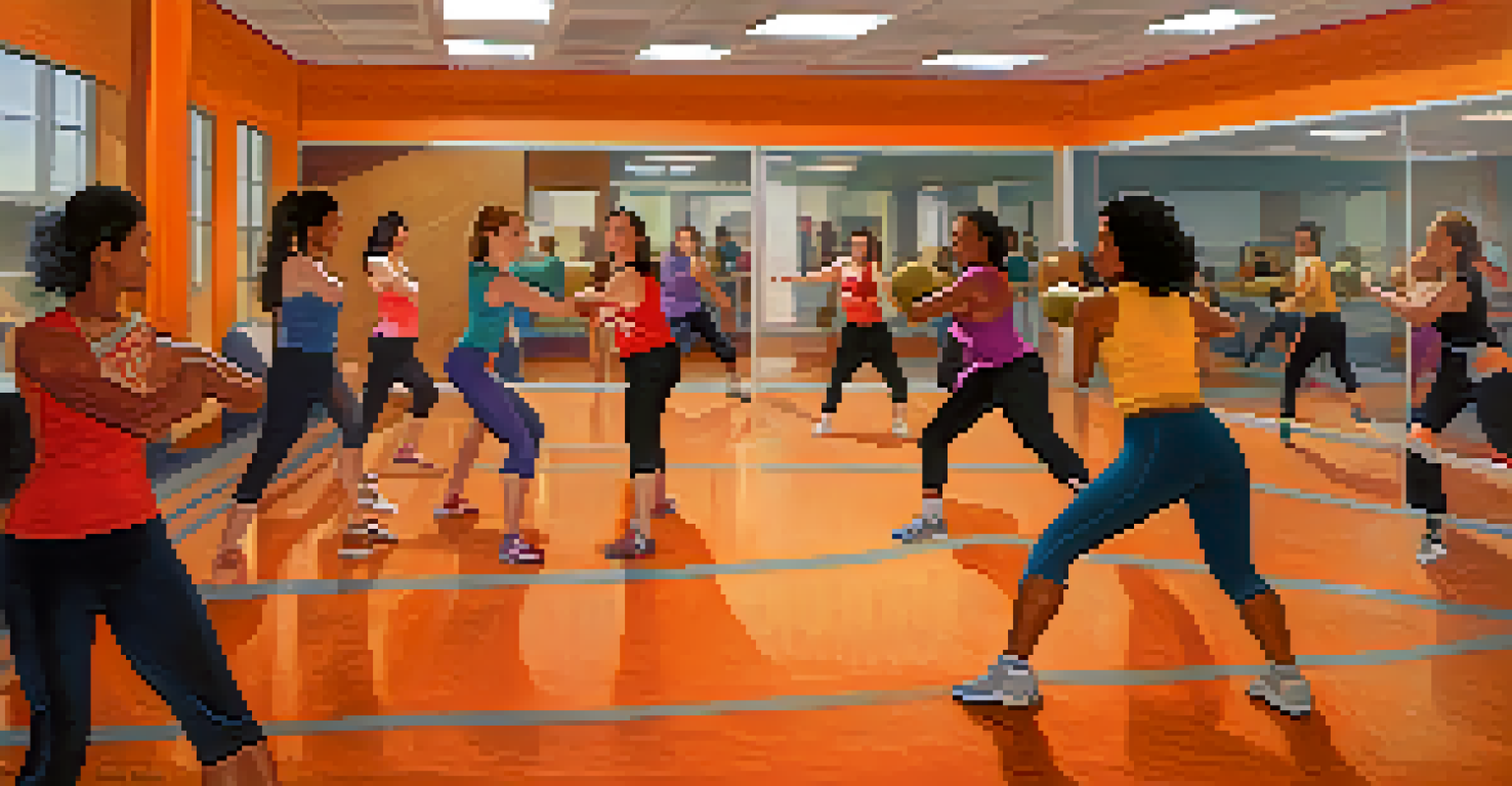Building a Self Defense Mindset: Mental Preparedness for Women

Understanding the Importance of Mental Preparedness
Mental preparedness is a crucial component of self-defense that often gets overlooked. It's not just about knowing physical techniques but also about how you think and react in high-pressure situations. Embracing this mindset can empower women to respond more effectively when faced with potential threats.
The greatest weapon against stress is our ability to choose one thought over another.
When you develop a self-defense mindset, you're essentially training your brain to stay calm and focused, even in stressful situations. This mental clarity can make all the difference in your ability to assess a situation and make quick decisions. Think of it like preparing for a big exam; the better prepared you are mentally, the more confident you will feel when the time comes.
Moreover, by prioritizing mental preparedness, you can cultivate a sense of awareness in your daily life. This means being attuned to your surroundings and recognizing potentially dangerous situations before they escalate. Ultimately, it's about equipping yourself with the tools to navigate the world with confidence.
Cultivating Situational Awareness
Situational awareness is your ability to perceive and understand the environment around you. It's like being a detective in your own life, constantly observing and assessing what’s happening. By honing this skill, you can spot potential threats early and take proactive measures to protect yourself.

To cultivate situational awareness, start by practicing mindfulness during your daily activities. This could mean paying attention to the people around you while walking in a parking lot or noticing unusual behavior in a crowd. The more you train your brain to be observant, the more natural it will become to identify potential dangers.
Mental Preparedness is Key
Developing a self-defense mindset enhances your ability to stay calm and make quick decisions in high-pressure situations.
Additionally, consider role-playing scenarios with friends or family to simulate real-life situations. This can help you practice your responses and reinforce your awareness skills, turning the abstract concept of situational awareness into a concrete practice. Remember, awareness is your first line of defense.
Building Confidence Through Education
Knowledge is power, especially when it comes to self-defense. Understanding your rights, local laws, and available resources can significantly boost your confidence. This foundational knowledge not only prepares you for potential encounters but also empowers you to advocate for yourself and others.
Confidence comes from discipline and training.
Consider enrolling in self-defense classes or workshops specifically designed for women. These classes often teach practical techniques along with strategies for recognizing and avoiding dangerous situations. The more you learn, the more equipped you will feel to handle any scenario that may arise.
Moreover, engaging with online resources and communities can provide additional support and motivation. Sharing experiences and learning from others helps build a collective knowledge base that can inspire confidence. Remember, education is a continuous journey; every bit of knowledge brings you closer to empowerment.
Harnessing the Power of Visualization
Visualization is a powerful mental technique used by athletes and performers to enhance their focus and performance. In the context of self-defense, it involves imagining yourself successfully navigating a threatening situation. This mental rehearsal can help reduce anxiety and prepare your mind for real-life encounters.
To practice visualization, find a quiet space and close your eyes. Picture yourself in a potentially dangerous scenario and envision the steps you would take to protect yourself. The more detailed your visualization, the more effective it will be. This practice not only boosts your confidence but also allows you to approach real situations with a calmer mindset.
Situational Awareness Matters
Cultivating situational awareness helps you recognize potential dangers early, allowing for proactive self-protection.
Incorporating visualization into your routine can be as simple as spending a few minutes each day imagining success. It’s like training your brain to respond instinctively when faced with challenges. Ultimately, this technique can transform your self-defense mindset into a proactive and empowering tool.
Emotional Regulation: Staying Calm Under Pressure
Emotional regulation is the ability to manage your emotions in challenging situations. When faced with a threat, it’s natural to feel fear or panic, but learning to control these feelings can be vital for your safety. By practicing emotional regulation, you can enhance your decision-making skills and maintain focus during high-stress situations.
Techniques such as deep breathing, grounding exercises, and positive affirmations can help you stay calm when it matters most. For instance, taking slow, deep breaths can activate your body's relaxation response, allowing you to think clearly. Practicing these techniques regularly can make them second nature when you need them most.
Moreover, consider journaling your thoughts and feelings to better understand your emotional triggers. This self-awareness can help you develop strategies to manage these emotions effectively. Remember, staying calm under pressure is a skill that can be cultivated with practice.
Creating a Supportive Network
Building a network of supportive friends, family, and mentors can significantly enhance your self-defense mindset. These connections provide not only emotional support but also practical advice and shared experiences. Having a safety net allows you to feel more secure and empowered in your daily life.
Consider joining local self-defense groups or community organizations focused on women's safety. These spaces often foster camaraderie and offer opportunities to learn from one another. Sharing experiences and strategies can help reinforce your knowledge and boost your confidence.
Build Confidence Through Knowledge
Educating yourself on self-defense techniques and local laws empowers you to advocate for yourself and feel more secure.
Additionally, don’t hesitate to lean on your network when facing challenges. Whether it's discussing a recent experience or seeking advice on difficult situations, a supportive community can make a world of difference. Remember, you don’t have to navigate this journey alone.
Embracing a Growth Mindset
A growth mindset is the belief that abilities and intelligence can be developed through dedication and hard work. Embracing this perspective can be transformative in building your self-defense mindset. Instead of viewing setbacks as failures, consider them opportunities for growth and learning.
When it comes to self-defense, this means being open to learning from experiences, whether they are positive or negative. If you find yourself in a challenging situation, reflect on what you can learn from it rather than dwelling on what went wrong. This approach fosters resilience and empowers you to tackle future challenges with confidence.

Incorporating a growth mindset into your self-defense journey encourages continuous improvement. Celebrate your progress, no matter how small, and remember that every step forward is a victory. By nurturing this mindset, you position yourself for ongoing success and empowerment.